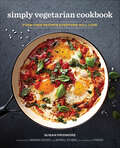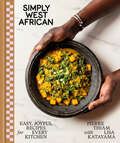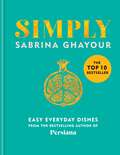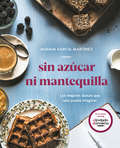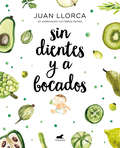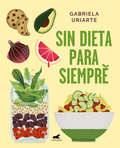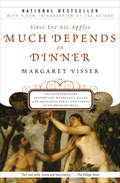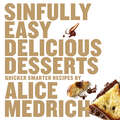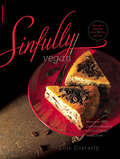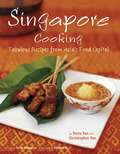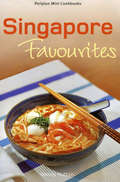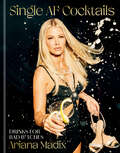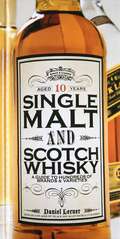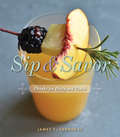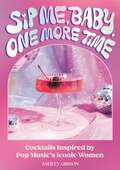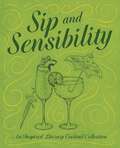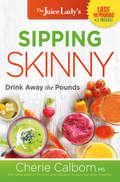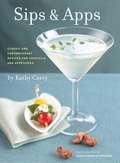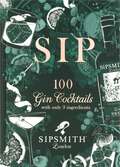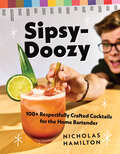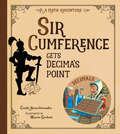- Table View
- List View
Simply Vegetarian Cookbook: Fuss-Free Recipes Everyone Will Love
by Susan PridmoreDiscover the stress-free way to stay vegetarian with easy, everyday comfort recipes from The Simply Vegetarian Cookbook.Simplicity—it's the only ingredient that should be in every vegetarian recipe. When you're short on time, low on ingredients, or cooking for omnivores and carnivores alike, The Simply Vegetarian Cookbook stocks your kitchen with the easiest, everyday recipes that anyone can pull off, any day of the week.This vegetarian cookbook features recipes grouped by type of cooking ease. From 5-Ingredient to 30-Minutes or Less to One Pot recipes, The Simply Vegetarian Cookbook allows you to decide what to cook not only by what looks good—but also by what's the easiest for you.Simplicity is the main ingredient of every recipe in this vegetarian cookbook, with:Easy-to-find ingredients that you can buy year-round in your local marketEasy-to-make comfort meals for lunch or dinner, with a handful of side dishes, breakfasts, and snacksEasy-to-adapt recipes for vegans and meat eaters, with substitution tips for recipes, plus an entire category devoted to making one dish in two different waysFrom Portabella Eggs Florentine to Baked Eggplant Parmesan, The Simply Vegetarian Cookbook serves up fuss-free, everyday recipes to make your life easy.
Simply West African: Easy, Joyful Recipes for Every Kitchen: A Cookbook
by Pierre ThiamExperience the vibrant cuisines of West Africa any night of the week with 80 easy, accessible recipes &“Chef Pierre Thiam offers an entry point into the cooking of a region that has been ignored by the mainstream food culture for way too long.&”—Jessica B. Harris, culinary historian and author of High on the Hog: A Culinary Journey from Africa to AmericaThis is West African food for every kitchen, a generous, warm welcome to its delicious, irresistible culinary mainstays and rhythms. If you already cook with ingredients like hearty greens, yams, black-eyed peas, and okra, or have enjoyed Southern staples like jambalaya and gumbo, you have tasted the deep culinary influences of this interconnected region that spans Senegal, Ghana, Côte d'Ivoire, Cameroon, Nigeria, and more. Now, in Simply West African, celebrated chef and West African cooking authority Pierre Thiam unlocks the region&’s essential tastes for the everyday home cook. With helpful tips and tricks that teach readers the basics of the cuisine, Pierre shows how seamlessly these flavorful, easy-to-execute dishes can become weeknight staples or the star of your table for weekend gatherings. Introduce family and friends to:· Familiar dishes with a distinctly West African vibe: Chicken Yassa Tacos; Saucy Shrimp and Fonio Grits; Maman&’s Crispy Herb-Crusted Chicken; Blackened Salmon with Moyo Sauce· One-pot crowd pleasers: Root Vegetable Mafe; Chicken Stew with Eggplant; Tomato, and Ginger; Braised Beef and Collard Greens· Hearty vegetables and starchy soak-em-ups: Roasted Eggplant in Peanut Sauce; Double Coconut Rice and Peas; Smoky Black-Eyed Pea MashWith this book, you too will fill your kitchen with the comforting, irresistible flavors and beautiful spirit of West Africa.
Simply: Easy everyday dishes
by Sabrina Ghayour'I have been looking forward to Sabrina Ghayour's new book, Simply, ever since I knew she was writing it... Every page is an invitation to cook.' - Nigella Lawson'Packed with the Iranian-born cook's trademark Persian flavours' - The Herald'The food has immediate "eat me" appeal' - Diana Henry, Sunday Telegraph's 20 Best Cookbooks To Buy This AutumnEasy. Everyday. Simple.Sabrina Ghayour's new collection of unmissable dishes in her signature style, influenced by her love of fabulous flavours, is full of delicious food that can be enjoyed with a minimum of fuss. With sections ranging from Effortless Eating to Traditions With a Twist, Simply provides over 100 bold and exciting recipes that can be enjoyed every day of the week.CONTENTS Chapter one: Effortless Eating Including Spiced carrot & tamarind soup; Date & ginger chicken wings; Baked sweet potato & za'atar chips; Spring onion saladChapter two: Traditions with a Twist Including Green hummus; Kabab koobideh; Persian tahchin; Tahdig e macaroni; Mamen Maleh's borscht; Adas polowChapter three: The Melting Pot Including Steak tartines with tarragon & paprika butter; Chilled pistachio & cucumber soup; Ghayour house chicken kariChapter four: Something Special Including Spiced pork wraps with green apple salsa; Firecracker prawns; Green & black-eyed bean baklava; Mushroom dumplingsChapter five: Cakes, Bakes & Sweet Treats Including Stuffed dates with torched goats' cheese; Lime & black pepper frozen yogurt; Tahini, almond & orange brownies
Simply: Easy everyday dishes
by Sabrina Ghayour'I have been looking forward to Sabrina Ghayour's new book, Simply, ever since I knew she was writing it... Every page is an invitation to cook.' - Nigella Lawson'Packed with the Iranian-born cook's trademark Persian flavours' - The Herald'The food has immediate "eat me" appeal' - Diana Henry, Sunday Telegraph's 20 Best Cookbooks To Buy This AutumnEasy. Everyday. Simple.Sabrina Ghayour's new collection of unmissable dishes in her signature style, influenced by her love of fabulous flavours, is full of delicious food that can be enjoyed with a minimum of fuss. With sections ranging from Effortless Eating to Traditions With a Twist, Simply provides over 100 bold and exciting recipes that can be enjoyed every day of the week.CONTENTS Chapter one: Effortless Eating Including Spiced carrot & tamarind soup; Date & ginger chicken wings; Baked sweet potato & za'atar chips; Spring onion saladChapter two: Traditions with a Twist Including Green hummus; Kabab koobideh; Persian tahchin; Tahdig e macaroni; Mamen Maleh's borscht; Adas polowChapter three: The Melting Pot Including Steak tartines with tarragon & paprika butter; Chilled pistachio & cucumber soup; Ghayour house chicken kariChapter four: Something Special Including Spiced pork wraps with green apple salsa; Firecracker prawns; Green & black-eyed bean baklava; Mushroom dumplingsChapter five: Cakes, Bakes & Sweet Treats Including Stuffed dates with torched goats' cheese; Lime & black pepper frozen yogurt; Tahini, almond & orange brownies
Sin azúcar ni mantequilla: Los mejores dulces que uno pueda imaginar
by Miriam GarcíaTodo lo que necesitas aprender para preparar platos dulces sin caer en el azúcar ni en las grasas insanas. Miriam García, responsable del blog El invitado de invierno, fotógrafa y redactora culinaria, te enseña cómo hacer dulces con edulcorantes o endulzantes naturales y ligeros para que reduzcas tu ingesta de azúcar y mantequilla sin perder un ápice de sabor ni de placer. En este libro encontrarás una serie de recetas inéditas, acompañadas de fotos de la propia autora: galletas, bizcochos, tartas de frutas, helados, bollería y dulces para desayunos. La base teórica te ayudará a sacarle el máximo provecho a los ingredientes saludables y a hacer las mejores elaboraciones sin que te remuerda la conciencia.
Sin dientes y a bocados
by Juan Llorca Melissa GómezGuía de recetas fáciles y nutritivas para aquellas familias que quieren una alimentación complementaria y sabrosa para sus bebés. En este libro único, Juan Llorca, Chef responsable de la alimentación en Valencia Montessori School, y Melisa Gómez, dietista-nutricionista especializada en pediatría, ofrecen recetas sencillas y consejos prácticos para apoyar a las familias que buscan dar una alimentación saludable a sus pequeños desde los primeros meses. Sin dientes y a bocados es una guía completa, accesible e imprescindible; ideal para ayudarte a resolver dudas frecuentes sobre el paso de la lactancia a la alimentación complementaria regulada y dirigida por el propio bebé (conocida también como Baby Led Weaning o BLW), y capaz de brindarte los recursos necesarios para ponerte en marcha y acompañarlo en las distintas etapas de su alimentación, desde su primer bocado hasta su primer cumpleaños
Sin dientes y a bocados: El libro imprescindible de iniciación al baby led weaning
by Juan Llorca Melisa GómezGuía de recetas fáciles y nutritivas para aquellas familias que quieren una alimentación complementaria y sabrosa para sus bebés. En este libro único, Juan Llorca, Chef responsable de la alimentación en Valencia Montessori School, y Melisa Gómez, dietista-nutricionista especializada en pediatría, ofrecen recetas sencillas y consejos prácticos para apoyar a las familias que buscan dar una alimentación saludable a sus pequeños desde los primeros meses. Sin dientes y a bocados es una guía completa, accesible e imprescindible; ideal para ayudarte a resolver dudas frecuentes sobre el paso de la lactancia a la alimentación complementaria regulada y dirigida por el propio bebé (conocida también como Baby Led Weaning o BLW), y capaz de brindarte los recursos necesarios para ponerte en marcha y acompañarlo en las distintas etapas de su alimentación, desde su primer bocado hasta su primer cumpleaños
Sin dieta para siempre
by Gabriela UriarteGabriela Uriarte, una de las dietistas-nutricionistas más influyentes de España, ofrece en este libro sus trucos para que tires la báscula, te olvides de las dietas y cambies tus hábitos alimentarios con comida real. Sin dieta para siempre es una guía tan completa como única en la que encontrarás consejos para hacer tu compra de comida real, pautas para leer etiquetas y distinguir entre un buen procesado y un ultraprocesado, estrategias para sobrevivir a las comilonas sociales y ejemplos para planificar tus menús semanales. Pero también descubrirás 33 recetas sencillas y saludables para desayunos, snacks, comidas y cenas, que te darán ideas y te ayudarán a organizarte mejor en la cocina. «Estas recomendaciones son el producto de años de consulta. Constituyen una manera diferente de hacer las cosas, de dejar de hacer dieta y de aprender a comer. Un enfoque práctico que te ayudará a hacer el día a día más sencillo y, sobre todo, más saludable.»Gabriela Uriarte, creadora de @gu_nutricion
Since Eve Ate Apples Much Depends on Dinner: The Extraordinary History and Mythology, Allure and Obsessions, Perils and Taboos of an Ordinary Mea
by Margaret VisserA staple of the food-writing genre that prefigured the current locavore and foodist movements by almost two decades, Margaret Visser’s Much Depends on Dinner is a delightful and intelligent history of the food we eat, and a cornucopia of incredible details about the ways we do it.Presented as a meal, each chapter of Much Depends on Dinner represents a different course or garnish, which Margaret Visser handpicks from the most ordinary American dinner: corn on the cob with butter and salt, roast chicken with rice, salad dressed in lemon juice and olive oil, and ice cream. Visser tells the story behind each of these foods and in the course of her inquiries reveals some unexpected treats: the history of Corn Flakes; the secret behind the more dissatisfactory California olives (they’re picked green, chemically blackened, and sterilized); and the fact that, in Africa, citrus fruits are eaten whole, rind and all.For food lovers of all kinds, this intelligent and unexpectedly funny book is a treasure of information that sheds light on one of our favorite pastimes: eating.
Sinfully Easy Delicious Desserts: Quicker, Smarter Recipes
by Alice MedrichHomemade desserts just got quicker, easier, and smarterAlice Medrich rewrites the dessert menu for cooks in search of totally doable desserts without hours of prep. In Sinfully Easy Delicious Desserts, you'll find the quickest lemon tart, a lattice-free linzer (mixed entirely in the food processor), one-bowl French chocolate torte (yes, the real thing, but easier to make), imaginative ways with ice cream, chic puddings and mousses to swoon over, and gooey pies with no-fault press-in crusts. Even soufflés for beginners. And you won't need a rolling pin, a pastry brush, or the skills of a professional baker. As always, Alice's recipes are foolproof and well tested, and her tips for success will make all cooks—even those nervous about baking—confident in the kitchen. Plus there are more than 100 ideas for spur-of-the-moment desserts that don't even involve baking, including fantastic ideas for ways to dress up a bar of chocolate, a pint of strawberries, a handful of dried fruit, fresh cheese, gingerbread, amaretti, and more. And of course all those spot-on combinations for which Alice Medrich is so well known, such as Grilled Pineapple with Coffee Ice Cream, Lemon-Scented Peach Crisp, Salted-Caramel Banana Bread Pudding, and Coconut Pecan Torte.
Sinfully Vegan: More than 160 Decadent Desserts to Satisfy Every Sweet Tooth
by Lois DieterlyWhat better way is there to end a meal than with a luscious piece of cheesecake, a rich slice of chocolate cream pie, or some chewy peanut butter cookies--all made with easy-to-find vegan ingredients? In this newly updated and expanded edition of Sinfully Vegan, Lois Dieterly shows you how to do just that, with more than 160 dairy-, egg-, and cholesterol-free recipes. Sinfully Vegan offers desserts from every shelf of the pastry case: cakes, candies, cookies, brownies, pies, tarts, puddings, and quick breads. Complete with essential baking and preparation tips, creative recipe variations, nutritional breakdowns, and wheat-free alternatives, Sinfully Vegan is the ultimate vegan dessert resource and an essential addition to any kitchen. And since there are no eggs in the batter, plenty of sampling is encouraged!
Singapore Cooking: Fabulous Recipes from Asia's Food Capital
by David Thompson Edmond Ho Terry Tan Christopher TanAn abiding Singaporean passion, food is a central part of life on this multicultural island quite simply because there's so much of it that's so good! <P><P>Singapore Cooking, featuring a foreword by David Thompson, is a fabulous collection of beloved local classics, including the most extraordinary Chicken Rice and Chili Crab you will have ever eaten, as well as less common but equally delightful dishes, such as Ayam Tempra (Spicy Sweet-and-Sour Stir-Fried Chicken) and Nasi Ulam (Herbal Rice Salad).The recipes are well written, easy to follow, and accompanied by beautiful color photographs. With this cookbook by your side your acquaintance--or re-acquaintance--with Singapore food promises to be an exciting and mouthwatering experience.Recipes include:Bergedel Potato Fish CakesSop Kambing Spiced Mutton SoupMalay-style Nasi Goreng Fried RiceLaksa Rice Noodle SoupSambal Roast ChickenHainanese Pork ChopsDevil CurrySingapore Chilli CrabFish Moolie in Spicy Coconut SauceBeansprouts with TofuPumpkin with Dried PrawnsKueh Dadar Coconut Filled Pancakes
Singapore Favourites
by Wendy HuttonDelicious recipes from Asia's food capital-including all the classic Singapore dishes like Chilli Crab, Chicken Satay, Laksa and Chicken Rice. This fascinating book introduces some of Singapore's favourite foods, and celebrates the rich and varied tastes that are the hallmark of Singapore cuisine.
Single AF Cocktails: Drinks for Bad B*tches
by Ariana MadixCelebrate reality television star and beloved bartender Ariana Madix&’s journey from heartbreak to empowerment with 60 high-drama cocktails that are as strong and inspiring as she is. When Ariana Madix famously discovered her partner was unfaithful, the incident—known as Scandoval—captivated audiences worldwide. She has now reclaimed her power, channeling her pain into a resounding statement of strength and resilience in Single AF Cocktails, a collection of alluring drinks that follow the trajectory of a relationship that starts beautifully but ends in disaster. The newly solo Ariana serves up her own recipes and perspective in a unique exploration of the stages of a doomed relationship. In her own words, Ariana takes back the narrative of her very public breakup while inspiring others to find inner strength in their own troubles. Each drink tells part of the story from her point of view, from when she first met her ex, through the insidious affair and its painful aftermath, and to her present state, coming out the other side, stronger than before. Cleverly categorized into relationship-inspired sections—Honeymoon Phase, Betrayal, Devastation, Resilience, and Ad Astra—Single AF Cocktails offers a range of boozy concoctions for whatever your mood, from when you feel like burning it all down to when it&’s time to rally your ride-or-die squad. You&’ll find recipes like Rumors, with dark crème de cassis that floats on top of the drink before bleeding into the spirits below, the way lies may find their way into your relationship, or We Ride at Dawn, a big, bold mezcal margarita that&’s equal parts power and healing. Full of stunning, powerful photography and never-before-told stories, Single AF Cocktails is a singular experience for the reader as they ride the rollercoaster of Ariana&’s story alongside her. Whether you&’re a longtime fan or a newcomer to Ariana&’s world, Single AF Cocktails promises a captivating and cathartic experience for all.
Single Malt Whisky: A Guide to the Whiskies of Scotland: Includes Profiles, Ratings, and Tasting Notes for More Than 330 Expressions
by Clay RisenA follow-up to his bestselling American Whiskey, Bourbon & Rye: A Guide to the Nation's Favorite Spirit, Clay Risen's Single Malt is an introduction to the long history, fascinating science, and incredible diversity of malted whisky, as well as a practical drinker's guide to buying and enjoying hundreds of the greatest examples of the distiller's tradition. With maps of essential whisky regions of Scotland, profiles of each of the makers, and photographs of the bottles and tasting notes for each of the most widely available expressions--compiled from tasting sessions conducted by a panel of leading whisky experts--readers will discover a rich vein of knowledge about one of the world's most storied beverages.Selected from more than one hundred active distilleries in Scotland, the 330 expressions featured in this book provide a curated yet comprehensive primer of the single-malt whiskies any growing aficionado should be familiar with. Additional features include a directory of distilleries, Risen's top whisky picks in various categories, and a full index of the expressions featured in the book.
Single Malt and Scotch Whisky: A Guide to Hundreds of Brands and Varieties
by Daniel LernerThis guide to single malt and Scotch whiskey is an essential resource for novices and seasoned experts alike. It includes more than 200 brands and varieties of Scotch and single malt whiskey. Ratings and detailed information on Scotch and the Scotch industry are included. Information on each brand includes the varieties' strength, aroma, flavor, and distinguishing characteristics. The history and lore of single malt and Scotch whisky is shown in both text and color photographs.
Sip & Savor: Drinks for Party and Porch
by James T. Farmer IIIThe Wall Street Journal bestselling Southern author of A Time to Celebrate shares refreshing beverage recipes for every occasion—no alcohol required! Sip & Savor features delectable non-alcoholic libations perfect for parties or for relaxing at home. Fruity drinks and creamy milkshakes combine with teas infused with garden herbs for dressing up your next tete-a-tete. In these pages, James Farmer will teach you how to build your drinks from the bottom up—with simple syrup recipes that capture the flavors of the seasons. You&’ll also get tea-brewing tips (for that perfect Sweet Tea) and the secrets to perfect cordials, punches, and slushes that make any get-together unforgettable. A few special cake and breads recipes, plus stories and history, capture the traditional experience of entertaining on the porch. Praise for James T. Farmer and his books &“A Southern gentleman who&’s just as charming in the garden as he is in the kitchen. He&’s compiled all his botanical experiences into A Time to Plant.&”—Harper&’s Bazaar &“A Time to Cook, A Time to Plant and A Time to Celebrate are titles of three of his books that inspire readers to cultivate, decorate and salivate over their own efforts in the kitchen. His books contain descriptive text combined with colorful photographs and garden-to-table recipes.&”—The Virginian-Pilot
Sip Me, Baby, One More Time: Cocktails Inspired by Pop Music's Iconic Women
by Ashley GibsonMy thirstiness is killing me . . . As gorgeous as your favorite album art and as irresistible as a catchy hook, a collection of stunning (and stunningly easy) cocktail recipes based on pop songs by iconic women. With a great drink in your hand and the perfect song playing, you can transform any place into your own personal party. Pop music is unmatched when it comes to capturing a feeling, and this book is inspired by the great songs and women who define this genre, as well as some lesser-known artists whose music is as exciting as stumbling upon a new favorite liqueur that adds just the flavor you&’ve been missing.Sip Me, Baby, One More Time combines the art of cocktail making with the power of these artists to create an experience curated by emotion. Each chapter of this book is a journey through a playlist dedicated to a specific feeling—from coping with soul-crushing heartbreak to feeling like you want to hop on a table and dance it out—and is filled with easy to make, beautiful cocktails dedicated to tracks from top female artists.Featuring drinks inspired by songs from Britney Spears, Beyoncé, Taylor Swift, Rihanna, Ariana Grande, Lana Del Rey, BLACKPINK, The Spice Girls, Doja Cat, and many more.
Sip and Sensibility: An Inspired Literary Cocktail Collection
by Tim RaybornRaise a glass to iconic character and toast to their timeless tales in this charming cocktail book that masterfully blends classic literature with exquisite drinks."Three measures of Gordon's, one of vodka, half a measure of Kina Lillet. Shake it very well until it&’s ice-cold, then add a large, thins lice of lemon peel. Got it?" James Bond knows what he&’s about when it comes to cocktails. Now you can too with this collection that brings cocktails from the page to the glass. Whether you're a fan of classic literature or simply love a good drink, this book is sure to delight. Each recipe is thoughtfully crafted to reflect the essence of its literary inspiration, resulting in a symphony of flavors that will tantalize your taste buds and stoke the fires of your imagination. Inside you'll find:Daisy's mint julep in the Great GatsbyThe famous James Bond vesper martini from Casino RoyaleEbenezer Scrooge's smoking bishop in A Christmas CarolHolden Caulfield's scotch & soda in The Catcher in the RyeLove in the Ruins gin fizzThe Jack Rose from The Sun Also RisesTerry Lennox's and Marlowe&’s Gimlet in The Long GoodbyeThe negroni from A Farewell to ArmsThis book provides expert guidance on crafting the perfect drink, along with tips on selecting the right glassware, garnishes, and techniques to elevate your creations. Dust off your bookshelf, polish your cocktail shaker, and savor every page while you quench your thirst for literary libations.
Sipping Skinny: Drink Away the Pounds
by Cherie CalbomAdding juices and smoothies to your diet can help you lose weight and improve your health. (A recent study at China Medical University showed that drinking a glass of tomato juice each day helped twenty-five women lose weight.) But replacing a meal or two each day can dramatically speed weight loss. You can make a meal-replacement smoothie or choose a glass of fresh juice. Or you can sip bone broth for a meal or two, or a day or two and watch the pounds melt away. Other drinks that will help you lose weight include apple cider, electrolyte replacers, teas, flavored water, lemon juice, and honey with water. Until now people have focused primarily on one beverage for weight loss. I encourage you to look at all of them and their potential as weight-loss helpers. Why be limited to one type of drink? Why not try them all for an interesting time &“sipping skinny&”?FEATURES AND BENEFITS:No expensive meals to buy. Save money while you make healthy choices.No complicated diet plan. Just sip your way to losing weight.No more boredom with juice, smoothies, or bone broth. Drink them all! Change it up!This book is unique because the author brings all the beverage options together under one cover.
Sips and Apps
by Kathy Casey Angie Norwood BrowneWhen it comes to cocktails and appetizers, chef Kathy Casey is an expert at balancing flavors and textures. Sips & Apps has 100 recipes that include not only classics like the Martini and Manhattan but also creative new concoctions like the Douglas Fir Sparkletini and the Blue Thai Mojito. Appetizers include simple finger foods like Roasted Pear Crostini with Gorgonzola and ChaCha Cashews and more substantial treats like Asian Shrimp Cakes with Sweet Chili Sauce. Lots of info on stocking a home bar and plenty of techniques and extras (like a nifty double ribbon marker labeled "sips" and "apps") make it easy to match up the right sip with the right app.
Sipsmith: 100 gin cocktails with only three ingredients
by SipsmithCocktails don't need to be complicated to taste delicious. Take cocktails back to basics with Sipsmith's uncompromisingly handcrafted gin. 100 gin cocktails, all with only three ingredients.Enjoy fuss-free drinks, from summer sipping to winter warmers, time-honoured classics to new twists. Along the way, you will find expert mixing tips, drink history and stories worth reading over a Martini or two.Delicious cocktails range from classics such as the Negroni and Martini to drinks for sipping at occasions, whether it's an Earl Grey Sour for a nightcap, or a new take such as a Gin Espresso Martini.Recipes include: Dry Martini Negroni Gin Fizz Gin Basil Smash Watermelon Martini Hot Gin Twist Earl Grey Sour Gin Caipirinha Dark Fruit Bramble Gin Espresso Martini ...and many more.
Sipsmith: 100 gin cocktails with only three ingredients
by SipsmithCocktails don't need to be complicated to taste delicious. Take cocktails back to basics with Sipsmith's uncompromisingly handcrafted gin. 100 gin cocktails, all with only three ingredients.Enjoy fuss-free drinks, from summer sipping to winter warmers, time-honoured classics to new twists. Along the way, you will find expert mixing tips, drink history and stories worth reading over a Martini or two.Delicious cocktails range from classics such as the Negroni and Martini to drinks for sipping at occasions, whether it's an Earl Grey Sour for a nightcap, or a new take such as a Gin Espresso Martini.Recipes include: Dry Martini Negroni Gin Fizz Gin Basil Smash Watermelon Martini Hot Gin Twist Earl Grey Sour Gin Caipirinha Dark Fruit Bramble Gin Espresso Martini ...and many more.
Sipsy-Doozy: 100+ Respectfully Crafted Cocktails for the Home Bartender
by Nicholas HamiltonFrom a social media powerhouse, a witty and unpretentious cocktail collection featuring both classic and original recipes, vibrant photography, and whimsical illustrations. After a pandemic-ridden two years in Los Angeles, Nicholas “Nic” Hamilton—an Australian-born actor, musician, and somewhat-recently-turned content creator—moved to New York and turned to the internet to showcase his passion for mixology, posting witty-yet-educational cocktail-crafting videos to TikTok, garnering an audience of over 1 million followers in a matter of weeks. Now, the superstar is channeling that energy into Sipsy-Doozy, his premiere cocktail cookbook, where he shares his own take on favorite cocktail classics alongside 80 original recipes. These drinks are as quirky as they are delicious, including his Affogato Martini, Bitters Sweet Symphony, Drive My Sidecar, and more. Following his successful merch drops, fans of Nic’s will come to this book for a piece of him as much as for the fabulous recipes, that is, if they’re respectful in this house.
Sir Cumference Gets Decima's Point (Sir Cumference)
by Cindy NeuschwanderPart of the popular Sir Cumference series! Baker Pia is back with a handy way of counting by tens and fractions in this fun introduction to the decimal system.This time the focus is back on Pia of Chartres from Sir Cumference and the Off-the-Charts Dessert. She is kidnapped by a family of ogres--Tentt, the father, Hoondrit, the mother, and their ten daughters, Una to Decima. Pia is asked to help the ogres prepare a feast for a large celebration, which will involve tens, hundreds, even thousands of pieces of dessert! Readers will learn about place value and the decimal system of notation in this latest medieval math adventure. The endnote includes a diagram with place names.
